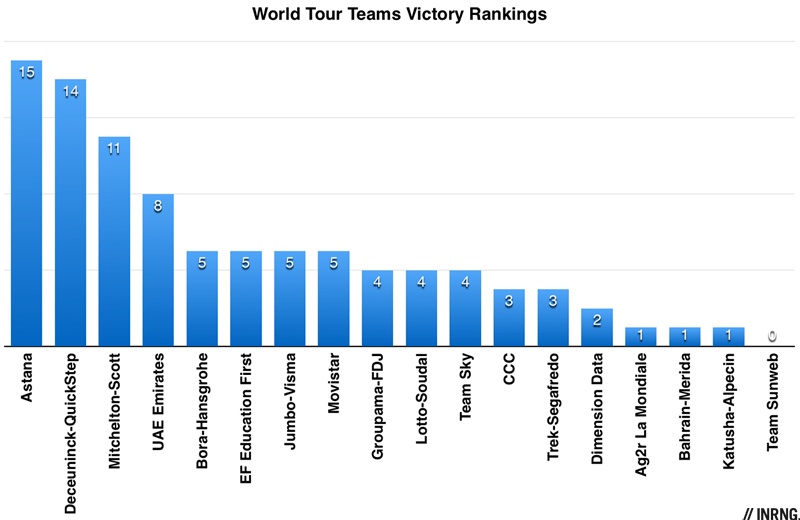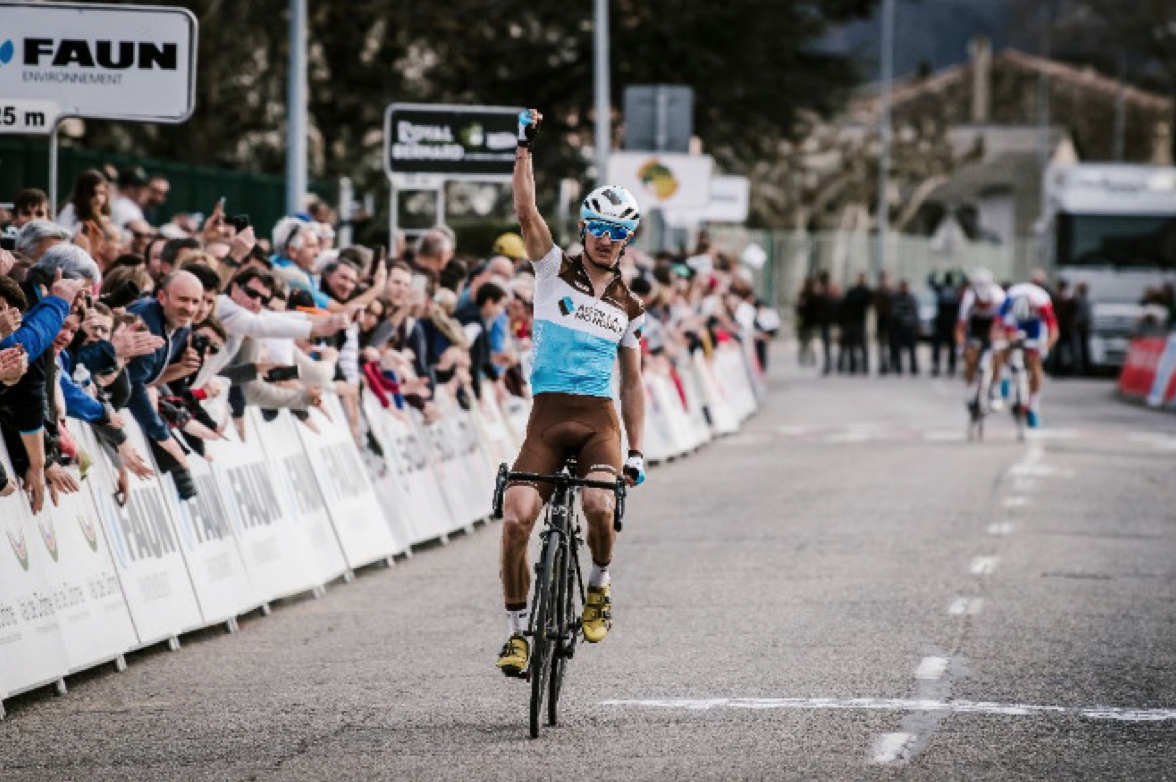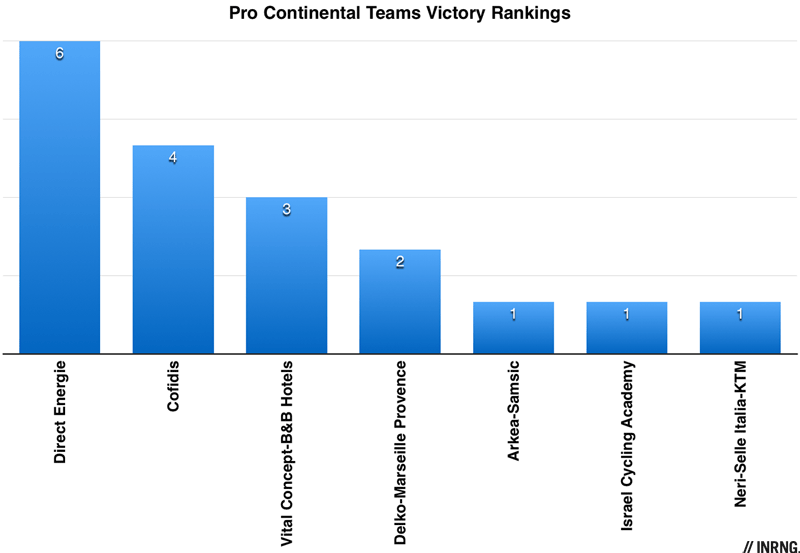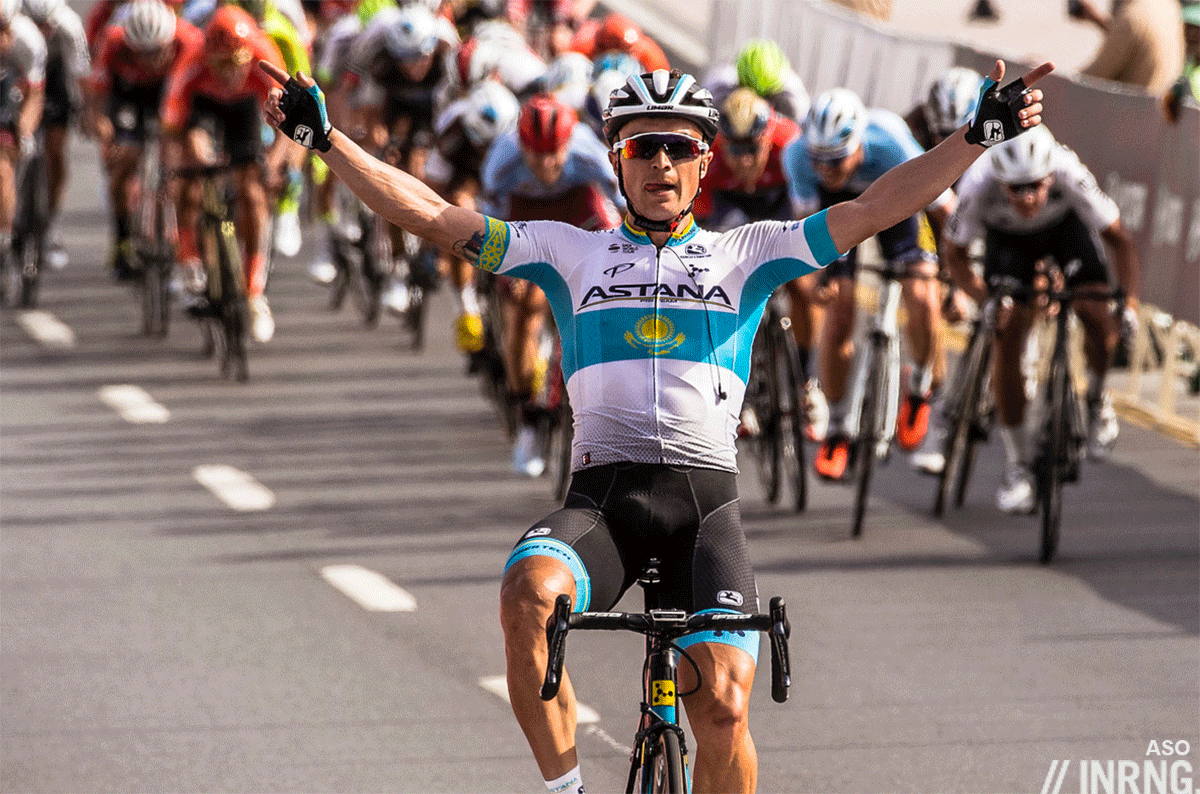With a lull in the racig between the GP Le Samyn and the Strade Bianche this weekend a chance to take stock of the season so far. As ever the quantity and quality of wins are not the same thing, every team manager would happily trade 50 wins for the Tour de France but the chart is a chance to take stock of where teams are at.

Astana top the rankings and interestingly there’s not one sprint win. We normally expect teams and their house sprinters to rack up the wins – most races end in sprints – but Astana have won seven stage races overall. It’s remarkable and it’d be good to know more, was this a deliberate to hit the early season so hard or did the cards just fall this way? The real test is yet to come, it’s one thing to win the Tour of Rwanda or the Tour of Oman and some early season races but can they start winning Paris-Nice, the Volta a Catalunya, Basque Country and Romandie… let alone the Giro and Tour?
- A win is a win but is an early season win worth more? Arguably yes to a rider. Why, well collect say, an .HC stage race in February and you have the win and the points to your name and this counts for upcoming contract negotiations in the spring and summer. Win the same number of points in, say, September and most rosters are full and so the benefit is less immediate although if the market gets panicky your value can still shoot up.
Deceuninck-Quickstep are second for once. It’s easy to see them overtaking Astana in the coming weeks as March and April are both very busy months for race days and if not the Belgian team’s raison d’être certainly home roads. As said before here, they win a lot and a lot of them win and this week saw Florian Sénéchal take his first career win in the GP Le Samyn, he’s been a core rider but one of the rare members of the team never to have won. Notionally then sent a relatively weak squad to the race but had the numbers in the finish to get the win.
Mitchelton-Scott sit in third place and have the usual mix of climbing, stage race success and sprint wins. Are they not the most under-rated team in the peloton? We think of the fun-lovin’ backstage pass bogans but here’s a team that wins grand tours and monuments but somehow doesn’t have a reputation, an aura to match.
UAE Emirates sit fourth and seem to be on the up, they’re no longer the lostboys of Lampre and now have a growing budget and more expectations. As if to mark the changes all but one of their wins so far have come from new signings this year, like Fernando Gaviria, and Tadej Pogačar winning the Volta ao Algarve. The big goal is the Giro with Fabio Aru who will go to Boulder, USA in for altitude training, a novel choice for April.
Among the others EF Education First have five wins already… when they had a total of six in 2018. The roster hasn’t changed but the team’s future is more settled and they’ve had some luck go their way. The biggest win must be the team time trial stage of the Tour Colombia where they beat Sky and Deceuninck. The team, especially sponsor Rapha, want to reach cycling fans differently, winning alone doesn’t create the “story” that marketeers want these days, the obvious image of a victory salute is nice but doesn’t tell much of a story. But you need to win as well.
Team Sky are on four wins, three from the Herald Sun Tour. Paris-Nice starts this weekend and it’ll be an interesting test for Egan Bernal as he’s due to lead the team in the Giro, a tall ask for a rider who’s biggest stage race success so far is the Tour of California. Yes he was towing Chris Froome on to the podium last July across the Aubisque so we know he can climb well deep in to the third week of a grand tour, it’s more how he copes with leading a big race and all the expectation that comes with it. There’s still no news of a replacement sponsor and the Colombian option seems to have dried up with gossip talking about a European sponsor. But it’s all talk until ink meets paper and could equally be a ruse to encourage riders not to think about signing elsewhere just yet. We’re in March already and deals start to get done from now onwards. This needn’t mean signing for a rival yet but discussions could start and the longer the uncertainty continues, the less inclined some will be to wait.
BMC Racing knew all about that as their sponsorship problems were only resolved in July. This time last year they had six win, now CCC have three. It’s arguably better than expected given the exodus of riders and we’ll see what Paddy Bevin does next, the Tour Down Under was a breakthrough result for him in terms of profile but he’d been a stalwart of BMC, an engine for the team time trial. The team won’t have as many wins and it won’t be as highly ranked either, a big emphasis went on harvesting UCI points.

Ag2r La Mondiale have a win thanks to Alexis Vuillermoz but Pierre Latour crashed in the UAE before starting the race and is out for several weeks with a broken wrist and this is going to be costly, the team doesn’t win much and needs points by placing on the GC in stage races and Latour could have done this.
Katusha-Alpecin finished 2018 in last place with just five wins and only have one so far thanks to Marcel Kittel in the Majorca challenge. If they didn’t promote much shampoo last year, it’s hardly flying off the shelves this year either so far. The team’s not got the budget of old but it’s problem is that aside from Kittel it doesn’t have many scorers. Nils Politt is strong in the classics but far from a racing certainty; Ilnur Zakarin is a top-5 contender for the Giro with podium potential but it’s hard to see him on the top step. They’re currently the lowest ranked World Tour team, and below Pro Conti teams Cofidis and Wanty-Gobert. Bahrain-Merida are also languishing below budget and expectations, one win thanks to Sonny Colbrelli but look closely at the roster and it’s hard to see wins galore although the likes of Vincenzo Nibali, Matej Mohorič and Dylan Teuns should deliver this year.
Team Sunweb sit last without a win. They finished 2018 with just 12 wins, they’re not a prolific but aim for quality instead. Rather than challenge for the Tour de France, Dumoulin is going back to the Giro and could well win, a prize that would dwarf any early season wins.

In the Pro Conti ranks and Direct Energie top the table thanks to Niccolò Bonifazio’s three stage wins and the overall in the Tour of Gabon. With Lilian Calmejane already winning and Niki Terpstra twice on the podium in the last three days in the Belgian classics they look like a shoe-in for one of the two last wildcards for the Tour de France. The remaining invite is between Arkea-Samsic and Vital Concept-B&B Hotels and for now Arkea look the more promising, despite fewer wins because they probably have more potential. It’s all going to come down to Paris-Nice but what can these two teams do? Launch breakaways on sprint stages? Frankly anyone can go up the road, a team firing riders into futile moves is “animating” the race but it’s also signalling it doesn’t have a plan, that it’s not holding riders back in support of their sprinter or keeping them fresh for the crunch stages to come. It puts a lot of pressure on André Greipel and Bryan Coquard for the sprints. Otherwise Cofidis are on four wins with three down to Christophe Laporte, a versatile rider who can win a bunch sprint and a time trial and should feature in the classics.


A couple of posts and especially this one have alluded to reaping UCI points.
Am I right to assume that points rankings for next season is impossible to make before next season rosters are finalized?
It’s complicated, here’s the UCI rule for teams with regards to their standings for a World Tour licence for 2020-2022: “The UCI world ranking for men UCI teams – 3 years shall be drawn up at least once a week by adding the points of each men UCI team in the UCI world ranking for men UCI teams of the “n-2” and “n-1” years established at the end of their respective season (as per article 2.1.001), with the points of each men UCI team in the UCI world ranking by men UCI teams of the current “n” season that was reset to zero at the beginning of the aforementioned season…
…The ranking is calculated by adding the points of the 10 best riders of each team taking into account the points scored by riders between the first day of the current season until the date of publication of the ranking.”
Thanks for pointing this out. Turns out it is available on the UCI website already.
https://www.uci.org/road/rankings
And unsurprisingly DQT/QST is top and SKY is second. But crucially at the bottom we have from 15-17 DDD – EF1 – CCC
18-20 COF-WGG-TKA
the last one actually quite worrying and a bit unexpected for me.
That isn’t the same ranking.
The one on the UCI site is the current ranking of teams based on the last 12 months’ performances by their current riders. At the end of the season it will become the final year that is added into the 3 year ranking referred to by Inrng that’s used for promotion and relegation, but it’s not there yet.
I have tried to work out the current 3 year rankings. Some parts of the rule are unclear (like whether performances in national champs or the Worlds count, and whether CCC will inherit BMC’s points), but I make the bottom 6 at present:
15 EF c 13,300 pts
16 Katusha c. 12,100
17 Cofidis c. 10,500
18 Wanty-Goubert c 9,500
19 Dimension Data 8,300
20 Direct Energie 7,700
CCC are either miles behind Direct Energie (if they don’t get BMC’s points), or in 3rd place overall (if they do).
Interesting that Sunweb don’t have a win yet but their focus on the Tour and Giro through Dumoulin gives them a relatively high profile nonetheless. Perhaps the relatively narrow focus with success in selected big events gives a much better return on the investment than wins in Oman, Rwanda etc.
Reference to a “story” is also very valid. I am a little biased as I used to live in Maastricht so Dumoulin got a lot of positive coverage. However, despite significant changes in the personnel of teams such as Astana, and the new Middle-Eastern teams, I find it very difficult to warm to their narrative.
Wether he just tested his legs and form or he really wanted the victory I don’t know but Dumoulin did some decent work during the UAE Tour.
Why would you leave Maastricht? Lol. I love that city. As an American, I’d love to retire there. Plus Dumoulin, although he moved across the border.
Same reason I assume Dumoulin moved – money! Retirement there is an option, though.
Since there must presumably be a considerable number of readers who sometimeswish like I do that you’d provide notes or a glossary: https://en.wikipedia.org/wiki/Bogan
Not only did DQS win the last three races, they also placed 2 additional riders in the top ten on all three occasions, quite impressive. They seem set to repeat the successes of the last few years. It will be a spectacle to behold, one way or the other, either they succeed and it really becomes an amazing feat or either somebody cracks the code and it will be a great accomplishment as well.
I presume like myself you are not a big fan of the stage races where Astana has marked their territory *wink.
Come on, Colombia is actually a great race (in a right-wing capitalist, liberal democracy – what else could you ever ask?).
And Rwanda is, too, although I don’t know much about their political situation.
Provence, Valencia, Murcia and Andalucía are lovely Mediterranean destination, albeit I’d suggest the countryside rather than the seashore. They often offered good racing, by the way.
Even Oman looks better than most of its neighbours (both in sporting and geopolitical terms)!
^__^
Inring, you say that Florian Sénéchal did the Tour de France for Quickstep in 2017. Wasn’t he riding for Cofidis that season?
Quick check over on PCS revealed quite surprising info:
Florian Senechal (born 1993, this year will turn 26)
2015 – Cofidis – finished TdF
2016 – Cofidis – DNF stage 12 Vuelta
2017 – Cofidis – finished TdF
2018 – QS – finished Giro
Correct, think I got confused by pictures of him from the Champs Elysées.
Inner Ring seems right to question the quality of Astana’s wins so far; interestingly not one of the fifteen victories has been in a WT race.
The strength of their ‘A’ team looks a match for anyone’s though.
Not that at this date of the year the WT label has any meaning at all in terms of actual quality.
Stage wins at the Down Under don’t bring along much more *quality* than those obtained by Astana in Murcia (which isn’t even HC). Same goes with other .1 race like Provence or Colombia, which are frankly more competitive than wishful thinking WTs like Cadel’s Great Ocean.
OTOH, Rwanda, while being a great race from many POVs, is not that meaningful from a technical standpoint, as WT teams and riders face a less prepared field of rivals. Of course.
The UAE Tour looked decently competitive, for a ready-made WT, but – sorry for the Eurocentric truism – things went really serious only at Het Volk… if anything.
Trying to avoid any further tedious debate, let me add that I consider quite fun and useful that riders and fans have got a variety of interesting warm-up races, and it’s totally legit that the UCI tries to promote this or that race with their now more or less void label (although that might become counterproductive, indeed), and I watch some of these races enjoying them much more than various recent Dauphinés (or Lièges), and a long list of etc.
It’s just that IMHO we shouldn’t use WT as a synonym of quality while it isn’t – at least, if we want to draw meaningful conclusions about, well, quality.
“…let me add that I consider quite fun and useful that riders and fans have got a variety of interesting warm-up races,…”
I completely agree. Despite the clamor that the “real” season didn’t start until last weekend, I’ve thoroughly enjoyed most of the races I’ve watched thus far.
+1
I wonder if it’s the same crowd who complain about the conservative TDF racing that also loudly ignore the early season racing
I wonder if Mitchelton Scott lack the mystique because the Australians are so laid back and casual.
That vibe is emitted by the whole team and as a result when they win it just seems like any other day of the week for them.
I’m loving the way Mitchelton-Scott have raced the early season. They are racing like they know they should be one of the favourites and attacking races, rather than waiting on others to chase the breakaway. Here’s hoping they can land a few big one day race results this season.
I am keen to see what happens with Fabio Aru this year after his collapse last season. I recall Gabriele posting some insights into his problems (overtraining being the main issue as I recall) and I thought I read that he was going to have a lighter program this year to be in better condition for his key races. It always seems like he is trying so hard and would be a shame if he is simply over training and failing to fulfill any of his undoubted potential because of misguided coaching. I would love to see him back to his best and add some panache to the GC battles.
He’s been having a tough time for years now. On paper the Giro doesn’t suit a climber like him but his best performances in recent years have arguably been in time trials, or at least his surprises like Megève in the 2016 Tour, the Rovereto TT in the 2018 Giro. Seems odd he’s going to Colorado for altitude training, Colorado itself is not that high up and it’s cold and often wet if you do start climbing higher (local readers will know better), compared to Teide etc.
Indeed. April is typically a very snowy month in Colorado (2nd snowiest after March, at least it was when I was a kid growing up there). And they’ve been getting heaps of the white stuff for the past several weeks I understand. Not an ideal place to ride in the spring.
Well, maybe thats Aru´s solution of not overtraining this year. He stays inside the rainy/snowy days.
Some of us think the real season doesn’t get underway until March 23 but I won’t claim the warm up races back on the continent haven’t been entertaining to watch. Victory rankings at this point in the season are kind of like who had the fastest lap in MOTOGP practice – sometimes it’s an indicator of the real racing outcome, sometimes not.
We got previews for both Nieuwsblad and KBK, do we wait until tomorrow for Strade Bianche? I’ll be on the road early tomorrow to see the race live so I was hoping we’d see it today 🙂
Larry, do you know the deal with the road maintenance – grading? – that has been done on the Strade Bianche route (according to a “Luca Rocchi on Instagram” video)?
Dirt and gravel roads can vary enormously, depending on how fine or coarse or rocky the surface is, but in my experience any work done just a few days before a road cycling race comes too late, i.e. the surface will actually be worse (for anyone who isn’t riding on 2.25-inch or wider tires) to ride on than before!
I’ve ridden various versions of L’Eroica in Tuscany over the years but I don’t know if the roads had been “rolled” ahead of time for the bici d’epoca event. Some of ’em I would certainly think had NOT. I remember going to the Strade Bianche Eroica Pro race the first time in 2010 and noting it looked like some of the sterrata sections had seen a bit of “grooming” beforehand compared to what we enj0yed. I would say rolling (or whatever you want to call) it improves the surface for cycling based on my experience on Colle Finestre, which is the photo that pops up on my posts here. That first visit was in the late summer as a preview for a tour route we offered the following year. The surface that day was much like the sterrata we’d ridden on at L’Eroica.
We next rode up there on the day the Giro was to come through and I was amazed at the changes, assumed to be from the “rolling” of the road!!! So amazingly smooth, I think Danilo DiLuca rode no-handed unwrapping an energy bar on one section! There was no way anybody could have done that back when this photo was taken. As much as I appreciated the smoother surface going up, it was really great for those of us who had to ride back down after the race had passed!
I think “larrikin” or “ocker” are more appropriate terms than bogan. Bogan does have a slightly negative connotation in Aus, similar but not as bad as “redneck”.
Agreed. The general view in Aus would be that bogans have a preference for revved-up cars, certainly not bikes, and they are much less interested in coffee than the M-S riders.